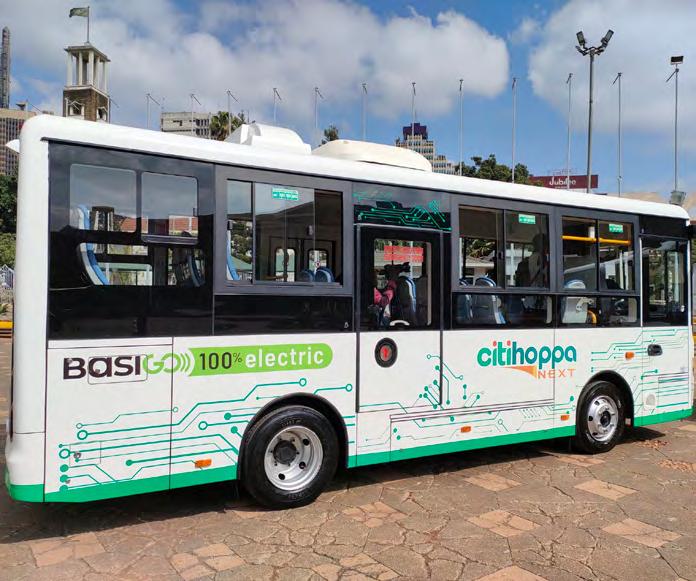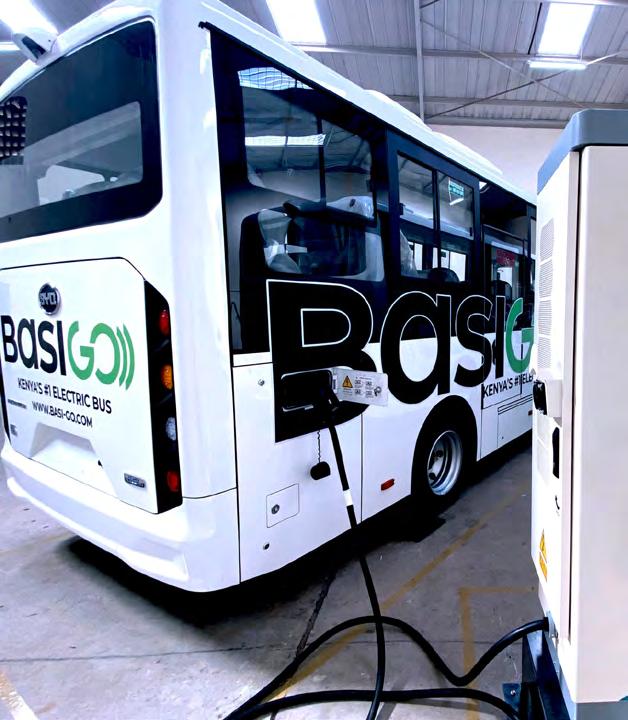
11 minute read
JIT BHATTACHARYA: CEO, BASIGO
BASIGO
DRIVING PUBLIC TRANSPORT SECTOR IN KENYA TOWARDS SUSTAINABILITY
By Alphonce Okoth In East Africa, an early-stage start-up is daring to revolutionise Africa’s public transport sector which is still dominated by diesel driven engine buses. Starting with 2 state-of-the-art electric buses, the startup led by founder and CEO Jit Bhattacharya is on a mission to make e-mobility the preferred public mode of transportation in African cities, starting with the green city under the sun, Nairobi. “We are in business to have massive and rapid impact on climate change and on-air quality here in East
Africa,” Jit tells CEO Business African team. “If this can work, we can take this to other cities and other commercial vehicles.”
C
LEARER SKIES VALIDATE BUSINESS
MODEL
The original idea to establish BasiGo came from the fact that East Africa has some of the cleanest and most affordable electricity in the world. Kenya produces over 70% of its electricity from renewable energy sources such as hydro, geothermal, solar, and wind. Jit explains that electrifying more parts of the economy would thus have more impact here than anywhere else on the planet where renewable energy still accounts for a small portion of total electricity produced. Starting out in Nairobi also had a strong business case since over 40% of commuters in the city with over 4 million inhabitants relied on public transport. With oil prices sky rocketing, an electric bus would also cost owners less to operate when compared to diesel engines.
Nairobi may have presented a strong business for Jit, a serial entrepreneur with over 12 years in clean energy, but the early days of the pandemic put into clearer focus why Jit and his partner Jonathan Green were willing to invest their time and money into the business. “During the very first few days of the pandemic, an interesting thing happened in Nairobi where for a period of days, public transport was stopped and in a matter of days, the air quality had improved. The sky became so clear that on a good morning you could see Mount Kenya and a glimpse of Mount Kilimanjaro which is hundreds of kilometres away from the city. This gave us a preview of what would happen if we finally get a handle of the problem.” In a nutshell, the clear sky and improved air quality made Jit and his partner confident that it was time to deploy their technology into the city.
QUALITY BUSES COMFORT BOTH PASSENGERS AND ENVIRONMENT
Apart from being emission free BasiGo buses offer commuters a level of comfort that they have never experienced when using traditional diesel-powered buses which have been the hall mark of the Matatu industry for decades. “This is a modern state of the art electric bus that is really beyond just being electric: it represents the future of what commuting and public transit should be like,” Jit boasts. To make the bus a reality, BasiGo partnered with BYD, the largest manufacturer of electric busses in the world. “They are an incredible partner. Their buses are currently operating in 50 countries spread across 300 cities around the world,” Jit says. “We are bringing this state of the technology here to East Africa. But tailoring it to make sure it can work on our roads and in our use conditions.” He tells us that many people who have had the chance to board the bus have always been taken aback by the level of quality they are met with.
SUSTAINABILITY AFRICA CEO: Jit Bhattacharya
COMPANY: Basigo
SECTOR:
E-mobility
COUNTRY: Kenya
WEBSITE:
www.basi-go.com
BASIGO MANAGEMENT TEAM

Can I afford this? Do I deserve this? Are some of the first questions that passengers boarding the BasiGo electric bus first ask themselves. To the surprise of many, the fare is always similar to what they normally would pay in a diesel bus, only this time they get to enjoy their ride and cut down their impact on the environment.
Making the buses affordable for the lower and middle income earners was deliberate. Jit tells us that for the BasiGo technology to work and to have the impact that they envision on reducing climate emissions and solving our air pollution problem, it has to be accessible for everybody, “Buses are currently the most affordable and accessible form of transport here in the city. We cant come in and create a luxury product that’s only for the wealthy in the nice parts of the city,” Jit explains. “This has to work for everybody, and that has been part of our mission from day number one.”
UNIQUE APPROACH TO VEHICLE FINANCING
The upfront cost of acquiring a new electric bus is more expensive than a diesel bus. This alone would dissuade many interested buyers from acquiring the units regardless of the fact that in the long-term, the cost of having an electric unit is significantly cheaper than that of a diesel bus. Having worked in the pay as you go solar home system sector, Jit and his partner Green, had just the right solution to make the bus affordable; a Pay As You Drive financing model. “What we are able to do through this model is we actually sell an electric bus for the same upfront cost as a diesel bus,” Jit explains. “And then what we do is we charge them a subscription per kilometer that they drive every single day.”
Clients under the Pay As You Drive model get access to the battery, free charging, and free service and maintenance from BasiGo’s expert service and maintenance personnel. “It removes all the risk of this new technology, essentially from the owners,” Jit says. “All they have to do is drive. In this way we can actually make that subscription cost less than what they are currently paying for diesel and maintenance.”
BUILDING FROM SCRATCH
BasiGo, being an early adopter of electric buses in East Africa, has had its hands full especially when it comes to deploying the technology. Charging infrastructure was the first priority to ensure bus operators could easily charge their batteries before the start of each working day. “They are running a business,” Jit explains. “We need to make sure that we are enabling and ideally improving their business. That means making charging very available and very convenient.” Partnership with electricity distributor Kenya Power was critical in the roll out of the charging units, according to Jit. “We needed to work with Kenya power from day number one to ensure that we are deploying in the right place, that they are prepared with the necessary infrastructure to support us growing as one of these very large high power electricity consumers.” Jit sees the partnership is one that is of benefit to both partners. He is confident that when it finally gets to scale, BasiGo can become the largest consumer of off-peak electricity (i.e electricity used between 11 p.m. and 5 a.m.) for Kenya Power.
Given that electric buses were new in the country, BasiGo also had to create a team of electric vehicle service engineers for this brandnew technology. “This was necessary to make sure that should anything ever happen to any of these vehicles, they can be back on the road almost immediately,” Jit explains. Getting the right people was however not a walk in the park as the industry was still in its early days of development. “You cant go out and say, oh, well, I want somebody whose been working in the industry for ten years. That doesnt exist here in Africa,” Jim tells CEO Business Magazine. To build its team, the company chose to go for the talented individuals who have been working within the renewable energy space or those working in automotive industry and training them on electric bus technology. “I am so proud of the team that we have pulled together who only a handful of them have actually had direct electric vehicle experience,” Jim says of his team. “And now they are one of the strongest e-mobility technology teams here in on the continent.”
EARLY STAGE INVESTORS BUY IN
The first external investment into BasiGo came in November 2021 when the EV startup raised US$1 million from Climate Capital, a Silicon Valley venture capital firm, and Third Derivative, an accelerator focused on climate-technology. The funding provided support for the laying of the groundwork necessary to launch the innovative electric bus technology. In February this year, a few months before going to market, BasiGo raised another US$4.3 million in a seed funding led by Novastar Ventures, with participation from a number of existing and new Silicon Valley investors, including Moxxie Ventures, Nimble Partners, Spring Ventures, Climate Capital and Third Derivative. BasiGo plans to use the new funding to set up an assembly plant in Nairobi and launch the sales and delivery of its electric buses.
Jim tells us that BasiGo had a relatively easy time raising funds because of the environmental aspects of the business. “There is a strong focus now on anything that can have climate impact so there is a lot of investment support,” Jim reveals. Moxie Ventures, one of the startup’s backers, has a strong climate focus, meaning it has funds to support these kind of business ideas. He further notes that previous experience, especially on the fundraising front, helped the duo in getting to convince investors to pump their money into the business. It also goes without saying that the entrepreneurs had extensive experience in the field if electric mobility. Over the course of his career, Jit has served as the CEO of Mission Motors in Silicon Valley and was also a senior manager at Project Titan — the secret electric car project by Apple Inc. More recently, he served as the Chief Technology Officer of Fenix International, an off-grid solar home system company acquired by the French multinational electric utility company ENGIE in 2018. His IN NUMBERS
US$ 5.3M
THE FUNDING IT HAS RAISED SO FAR IN SEED ROUND


partner, Jonathan Green, has over the past 15 years helped companies deliver renewable energy technologies to users in Africa. More recently, he held the role of strategy and operations director at Fenix International, where he led the delivery of more than 500,000 pay as you use solar systems to customers across six markets in Africa.
A climate enthusiast by nature, Jit tells any entrepreneur desiring to set up in Africa to go the green way. “Look for big impact that can help places like Africa now adapt and be resilient to the impacts of climate change,” Jit advises. He expresses confidence that startups with environmental impact will almost always attract the necessary funding to either set up or expand. “That's what investors want to see. And if you aim big and you have a strong business model behind you, even if there's a lot that needs to be proven, people are willing to give you that chance.”
NEXT STOP: 1,000 ELECTRIC BUSES
Having already proved that the EV concept is viable, BasiGo has its eyes on a bigger goal: to have over 1000 electric busses operating in Nairobi in the next five years. Jit however recognizes that scaling up will not be an easy ride. “We are competing against an industry that has been in place for over a hundred years,” Jit confesses adding that their small size puts them at a great disadvantage. “It will take us some time to get the scale, to get that number of vehicles every single year sold to get to local manufacturing,” Jit says. Not to be cowered by the odds, Jit has a plan in place for his ambitious startup. For him, a local assembly built with partners here in Kenya might be the silver bullet when it comes to dealing with competition head on. “We want to create make Kenya a hub for local manufacturing. All of that takes time. And yet we're in a hurry, yet the climate cannot wait. Our air quality here in Nairobi cannot wait.”
NATIONAL EV POLICY, A GAME CHANGER IN ELECTRIC TRANSPORT
According to Jit, the success of their company so far, can be attributed to the level of enthusiasm and support that it has received from the community in the entire transport ecosystem. The government has been particularly friendly and through the National Transport and Safety Authority (NTSA) worked closely with BasiGo to ensure that the new buses are safe for use on Kenyan roads.
Jit adds that the creation of the National EV Policy is one of the biggest support that the government could ever give the nascent industry. “It's exactly what the industry needs. It creates the enabling ecosystem for EV vehicles.” He believes that the policy is going to be a game change for the automotive industry at large. “This is going to be a massive transformation in the region, a massive transformation on the continent,” he says with confidence.
Kenya’s policy around local vehicle assembly is also something Jit believes aligns well with BasiGo’s ambitions. “We want to move to complete local assembly of these vehicles, and it's something that our partners also support. And so we're very we're very eager to move in that direction, and we're happy that the Kenyan government has already created an enabling environment,” Jit says.
Once BasiGo asserts itself in the 25 and 36-seater capacities where it is currently operating, the company plans to venture into other bus sizes and other commercial vehicle types that are not necessarily buses. The company is also looking at the possibility of taking the technology to other cities across East Africa. “That's what we actually need to achieve,” Jit says. “ It's not just about buses, it is about transforming transportation to be more sustainable. That's where we ultimately want this to go, and that's where we're investing our time and our energy” CBA





